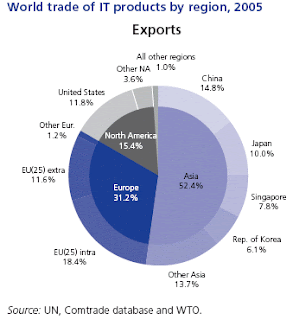One of my pet peeves about web sites in general and blogs in particular is that some of them don't make it easy to find out who has authored the material, what organization supports the content and so forth. To avoid that problem with this blog, I've posted a prominent link to my personal website, http://www.jamesflarson.com/ However, it occurred to me that, even on that site, it requires a couple of clicks to get to the May 2000 article in the Korean edition of Newsweek. Yet that article is probably the most interesting biographical information to explain my interests. It was published in Korean and I've also posted an English translation. Use the following links.
Friday, December 28, 2007
Sunday, December 23, 2007
Useful Links and Blogs on Korea's Information Society
Friday, December 21, 2007
Forthcoming Seoul Conference on "The Future of the Internet Economy
 The OECD will host a Ministerial Meeting on "The Future of the Internet Economy" 17-18 June 2008 in Seoul. It will examine the implications of the rapid growth in the use of the Internet for our economies and societies and the policies needed for continued growth.
The OECD will host a Ministerial Meeting on "The Future of the Internet Economy" 17-18 June 2008 in Seoul. It will examine the implications of the rapid growth in the use of the Internet for our economies and societies and the policies needed for continued growth. ©Picture: David Rooney
Saturday, December 15, 2007
VOIP services--global growth

The graphic depicts a worldwide trend toward greater use of the internet (VOIP services) to carry voice telephony. Since Korea is arguably the most networked (wired and wireless) country in the world, it will be of particular interest to see how quickly VOIP services penetrate the market. The growth of VOIP, along with internet television (IPTV), is part of the general phenomenon of convergence that will lead to ubiquitous availability of information.
Language and Cyberspace
A striking aspect of internet usage in Korea is that the vast majority of Koreans prefer to surf the web in their own language, 한국말. While you might think that this should come as no surprise, the strong preference for Korean is often overlooked by companies or organizations seeking to do business or conduct affairs in Korea. Some of them mistakenly assume that the near-universal passion for learning English in Korea means that people here will gravitate to English-language materials on the web. The available empirical evidence points instead to a strong preference for Korean language on the web. Data from the early 1990s to the present shows that the number of internet users in South Korea did not significantly increase until there was an increase in the number of .kr domain names on the web. The web site of the National Internet Development Agency is the best official source of such data, and it has an English-Korean toggle. http://isis.nida.or.kr/eng/ The continued dominance of NAVER as the internet search engine most frequently used by South Koreans has a lot to do with the fact that it is a Korean-language engine that returns largely Korean-language results. While on the subject of language, I suggest that Koreans who want to read my posts in Korean use Google Language tools. While this automated translation service is far from perfect, I think it is the best currently available. The steps are easy.
- Go to the language tools site http://www.google.com/language_tools
- Scroll down to "Translate a Web Page" and enter http://koreainformationsociety.blogspot.com/ Then on the scroll-down menu, set your preference to translate "English to Korean."
- Click on the "Translate" button and you will quickly have a rough translation of this site into Korean.
Look to this blog for further musings about the role of language in creating the boundaries of cyberspace.
"I Am Robot"
- One was the obvious enthusiasm of the college students for their projects.
- Another was how human-like some of the movements by the robots were. These were all humanoid robots, with two arms, two legs, and most of the major joints that a human being has.
- The audience for the robot competitions included quite a number of grade-school children and their enjoyment of the festival could be seen on their faces. Might this competition influence some of them to pursue a career in mechanical engineering and make a future contribution to robotics?
Korea is investing a great deal these days to develop the field of robotics. See, for example, the activities of the Intelligent Robotics Laboratory (지능로봇 연구실) in the Department of Mechanical Engineering at Korea University. http://robotics.korea.ac.kr/index.html?lang=eng Most of the other top universities have similar efforts underway, not to mention the work of government research institutes. Robots promise to play an interesting role in Korea's future information society as networks become ubiquitous.
Wednesday, December 5, 2007
Report Positions Asia, Korea in World IT Trade

